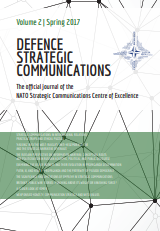PUTIN, XI, AND HITLER— PROPAGANDA AND THE PATERNITY OF PSEUDO DEMOCRACY
PUTIN, XI, AND HITLER— PROPAGANDA AND THE PATERNITY OF PSEUDO DEMOCRACY
Author(s): Nicholas O’ShaughnessySubject(s): Politics, Media studies, Communication studies, Political history, Recent History (1900 till today), Government/Political systems, International relations/trade
Published by: NATO Strategic Communications Centre of Excellence
Keywords: propaganda; coercion; soft power; Hitler; China; Putin; pseudodemocracy; pseudo-reality;
Summary/Abstract: This article poses an unsettling question. Was Hitler’s regime not so much a historical accident as a prototype—a creation of modernity and a response to the conditions precipitated by modernity? It constructs an answer via the exploration of the interdependency of a number of constructs. Through the building blocks of symbolism the propagandist constructs an imaginary world that is neither true nor false, but a pseudo-reality energised by the emotion of fear and both defined and constricted by ideology and beliefs. The article highlights significant differences between this Nazi prototype and modern practice to be taken into account. For example the Nazis had no theory of soft power; however, they were much more aware of the value of entertainment as propaganda than contemporary populist autocracies. The article promotes a rigorous examination of the evidence for the ‘impact’ of propaganda—How effective is it really?—and the need for a more sophisticated understanding of its effects and purpose.
Journal: Defence Strategic Communications
- Issue Year: 2/2017
- Issue No: 2
- Page Range: 113-135
- Page Count: 23
- Language: English

